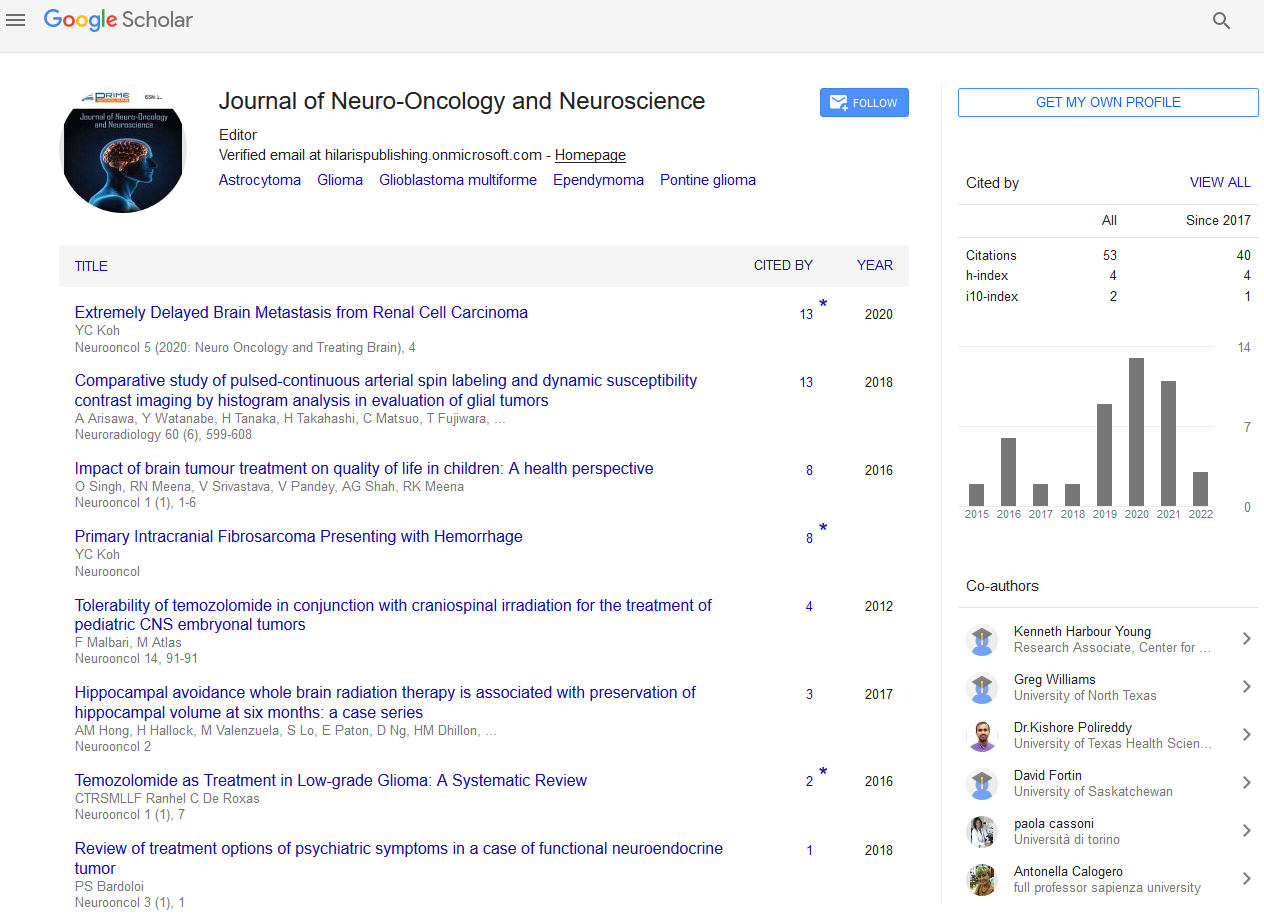Opinion - (2024) Volume 9, Issue 3
Genomic and Proteomic Profiling of Brain Tumors: Advancing Precision Medicine
Christian Ernst*
Department of Medical Oncology, Aarhus University, Denmark
*Correspondence:
Christian Ernst,
Department of Medical Oncology, Aarhus University,
Denmark,
Email:
Received: 02-Sep-2024, Manuscript No. IPJNO-24-21299;
Editor assigned: 04-Sep-2024, Pre QC No. IPJNO-24-21299 (PQ);
Reviewed: 18-Sep-2024, QC No. IPJNO-24-21299;
Revised: 23-Sep-2024, Manuscript No. IPJNO-24-21299 (R);
Published:
30-Sep-2024, DOI: 10.21767/2572-0376.9.3.22
Introduction
Brain tumors, particularly gliomas, are among the most
challenging forms of cancer to treat due to their complex
biology and resistance to conventional therapies. Over the
past decade, advances in genomic and proteomic profiling
have transformed our understanding of brain tumors, offering
new avenues for personalized treatment approaches. Genomic
profiling involves analyzing the DNA of tumor cells to identify
mutations, gene amplifications, deletions, and other alterations
that drive tumor growth. These genetic changes can serve as
biomarkers for diagnosis, prognosis, and treatment selection.
In glioblastoma multiforme the most aggressive form of brain
cancer, common genetic alterations include mutations in the
TP53, EGFR, and PTEN genes, as well as amplification of the
MDM2 gene. These mutations play critical roles in tumor
cell survival, proliferation, and resistance to therapy. The
identification of these mutations has led to the development
of targeted therapies aimed at inhibiting the specific pathways
involved.
Description
One of the most significant discoveries in brain tumor
genomics is the identification of mutations in the isocitrate
dehydrogenase gene. IDH mutations are found in a subset of
lower-grade gliomas and are associated with a better prognosis.
This discovery has led to the classification of gliomas into IDHmutant
and IDH-wildtype subgroups, with distinct clinical
behaviors and treatment responses. Genomic profiling has also
revealed distinct molecular subtypes of brain tumors, such as
the proneural, neural, classical, and mesenchymal subtypes
of GBM. Each subtype is characterized by specific genetic
and epigenetic changes, which influence the tumor’s biology
and response to treatment. This has important implications
for the development of personalized therapies, as different
subtypes may respond better to specific treatments. Proteomic
profiling involves the large-scale study of proteins, including
their expression levels, modifications, and interactions within
the tumor. Since proteins are the functional molecules in
cells, proteomic analysis provides critical insights into the
biological processes driving tumor growth. Proteomic profiling
of brain tumors can reveal aberrant protein expression
patterns that are not apparent at the genomic level. For
instance, overexpression of receptor tyrosine kinases like
EGFR and PDGFRA has been observed in GBM, driving tumor
cell proliferation and survival. Targeting these proteins with
specific inhibitors has become a therapeutic strategy in
treating brain tumors. Proteomic studies have also highlighted
the importance of post-translational modifications such as
phosphorylation, acetylation, and ubiquitination in brain
tumor biology. PTMs can modulate protein function, stability,
and interactions, thereby influencing key pathways involved in
tumor progression. The integration of genomic and proteomic
data, known as multi-omics, provides a more comprehensive
understanding of brain tumors. Multi-omics profiling enables
the development of personalized treatment strategies based
on the unique molecular characteristics of a patient’s tumor.
Conclusion
The field of genomic and proteomic profiling in brain tumors is
rapidly evolving, with advances in technology and data analysis
driving new discoveries. Future research will likely focus on
integrating other omics data, such as transcriptomics and
metabolomics, to provide an even more detailed understanding
of brain tumor biology. In conclusion, genomic and proteomic
profiling has revolutionized the field of neuro-oncology, offering
new insights into the molecular underpinnings of brain tumors.
These advances are paving the way for precision medicine
approaches that tailor treatment to the unique molecular
characteristics of each patient’s tumor, ultimately improving
outcomes and quality of life for patients with brain tumors.
Citation: Ernst C (2024) Genomic and Proteomic Profiling of Brain Tumors: Advancing Precision Medicine. Neurooncol. 9:22.
Copyright: © 2024 Ernst C. This is an open-access article distributed under the terms of the Creative Commons Attribution License, which permits unrestricted use, distribution, and reproduction in any medium, provided the original author and source are credited.

